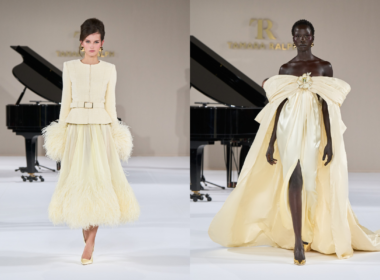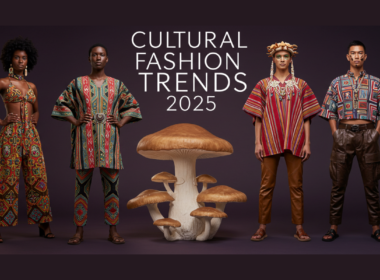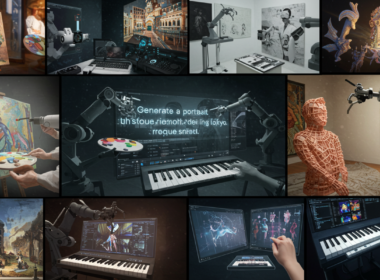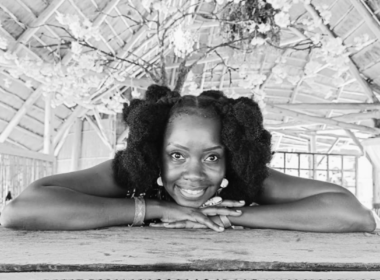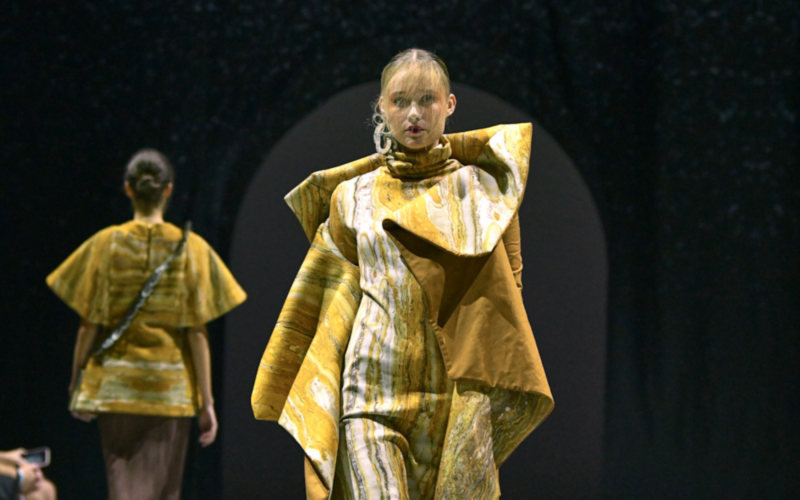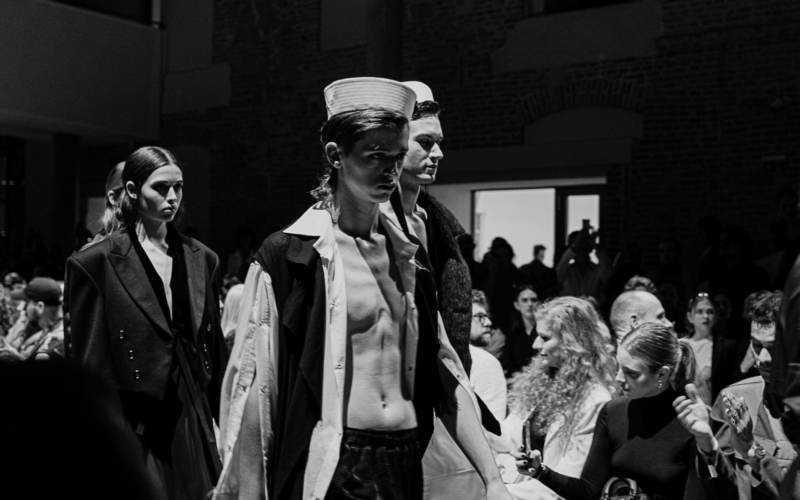Delving into Dr. Kessington Okundaye’s mind is like entering a gallery of life experiences. He’s the son of Chief Nike Davies-Okundaye, the force behind West Africa’s Largest Art Gallery, Nike Art Gallery. With a background steeped in information technology and business administration, Dr. Kessington’s foray into the art world might seem unexpected. However, as he shares, it was always about curiosity—the desire to comprehend the inner workings of things. In this exclusive conversation with Fabl’style Magazine, Dr. Kessington Okundaye, the genius behind Eko Art Gallery, shares insights on art, culture, and legacy. He emphasises the power of storytelling and the importance of humility in chasing dreams.
FAB: Can you share moments from your childhood that ignited your personal passion for the world of artistic expression?
Dr Kessington Okundaye: I guess sometimes we all take our immediate environment for granted. What I mean is that when you find yourself in a space, you don’t necessarily have an appreciation for that which you came into. For some of us, that realisation came with maturity. Don’t get me wrong, I’ve travelled around the world and had my own share of ‘wannabe westernised’ with little appreciation for that which we were born with. As you start to mature, you have the opportunity to take a step back. At least for me, that was what basically happened.
Looking at everything from western culture to western deities to western values, I decided to question these things. What makes this belief system better than my belief system? What makes this way of dressing better than my way of dressing? Why is it that an Englishman cannot speak any Nigerian language? He is intelligent and educated, but if a Nigerian cannot speak English, it means he is uneducated. Yes, I am well-educated. I have a PHD, but all of these things were part of my questions. What is it about western values, ways of life, and education? I decided to question a lot of things. I question religion. What’s the difference between Jewish mythology about creation and Yoruba mythology about Oduduwa descending from heaven? How’s that story so different?
At the end of the day, my conclusion is that it was the powerful who chose to write history the way they chose to write it. At that point, I decided to go back to the appreciation of some of the things that we had originally. Don’t get me wrong, it’s very difficult to shave off that indoctrination, but I had conversations with people of several religions. I asked questions about their religion, and they went into full-defense mode. But I wasn’t trying to insult anyone; I just wanted them to be a little more objective.
I went to Paris last year, and for the first time, I decided I wanted to go to the Musée du Louvre. In Particular, I was looking to see the famous Mona Lisa painting. For the life of me, I couldn’t see anything that was so original, so authentic, and so mystical that makes it any better than the artwork that we have at Nike Art Gallery. I am not saying it is not a good piece of art; I am not saying there’s no good story behind it, but all I could conclude was that someone chose to tell romantic stories about this piece of work.
So, the same thing goes if I tell a story about this teacup (pointing to the tea cup in his front) for the next five hundred years. At some point in the future, people will start to worship it. I won’t say that we have missed the opportunity. I think we have the unique opportunity to start doing the same thing. We need to go back and start reexamining some of our beliefs and value systems. Change is the only constant thing. We will evolve, but we cannot evolve by abandoning our history. We still have fragments of it. I say fragments because a lot has been diluted with western culture and values.
How well can we go back to examine our stories so that we can now tell them the way they should be told? We need to own our narrative. Nobody can tell a story better than we can. I interviewed a man, and I told him that I knew he had no work experience, but you are the best product that you know; sell yourself. Tell me your story. I’m sure your mother cannot tell your story better than you because it is your experience. That’s what it is for us.
We cannot continue to rely on western media to come and tell the story of Africa. We need to own it. Essentially, we need to start telling our story. We need to push that narrative because if we don’t, we will one day forget it, and the story will be told by somebody else, and they will tell it to suit their agenda.
I met an architect sometime last year, and he was building a small estate with about 150 homes. He wanted to build a community like what we used to have many years ago. A community with a central playing area, it was African-themed. I jokingly said that it was a beautiful idea—bamboo houses and huts—but still modern architecture. I said that one thing needed there would be a sacred place for the gods, and he said no.
For me, that’s what triggered the conversation. I asked him why, and he said that he is Christian. I then asked him what museums he had visited outside of the country. He mentioned a museum in Paris, and then I said that the museum has a section where they have all of the Greek gods. He said yes, that it is a beautiful place, and he went on and on about all of the Greek gods. (Smiling) He had all the names. Then I said, isn’t that just a shame? We are so quick, even as Christians, to embrace the Western European idols, but the minute we mention Sango, Orunmila, and Yemoja, you withdraw into your shell. I don’t fault you, but it simply speaks to how effective our colonial masters were. They conquered not just our physical bodies but also our minds. That is the easiest way to subdue your opponent, not with guns. They came with guns, but in order for them to maintain control over us, they had to control our minds, and they did that effectively using nothing but religion.
The first thing they did was tell us that the things we had believed in for thousands of years were evil. Now you have to believe in something else. What’s wrong with the necklaces? It’s all art. Even the diamonds were mined here. What’s a pirate? A pirate is now what those romantic movies are about. During Halloween, every child wants to dress up as a pirate, but nobody wants to dress up as Sango. The Somali pirate is an armed robber, but the western pirate is a romantic character. They have seen the power of storytelling. Information is the new gold rush.
You can win wars with storytelling, and we need to use that to tell our children and children’s children about our value system, our culture, and our art. Someone saw a beautiful mask piece in my bedroom from one of my favourite artists, Dr. Bolaji Ogunwo, a lovely piece. They walked into my room, and the wife was like “Oh my God, I can’t have such in my room”. What’s so scary about it? It should be more appreciated; it is something that is unique to us, but you’re happy to hang a photocopy of the Mona Lisa.
Change is the only constant thing. We will evolve, but we cannot evolve by abandoning our history.
Dr. Kessington Okundaye
FAB: You have expertise in information technology and business administration, which might seem like a far cry from the arts world. How have these seemingly unrelated fields influenced your own approach to running Eko Art Gallery?
Dr Kessington Okundaye: I have always loved technology, even as a child. We all have a hidden passion or flair for something. Technology has always been that thing I love to play with. For me, it has always been about curiosity. Every time I open up our radio set, I always ask why and how it works. As part of my own journey, that was one of the first things I wanted to explore. I wanted to know how things work. By knowing how things work, we can make better things, so I chose that career. Not only do I have a tech company that I run, but I also have medical practices, amongst other investments. Most importantly, my recent activities have been geared towards investing in young startups in Africa. My partners and I have been working together on raising funds for these startups. All part of giving back to our society.
Speaking about the gallery, it was a fruit of passion. Coincidentally, my wife, who is Igbo by birth, grew up in Benin (her mum is Benin). She grew up with a rich arts culture. Sometimes, she jokes that she only married me because of my mother. That’s how much love and passion she has for the arts. She chose the healthcare field because she has always been warm with elderly people, and she finds herself being a natural caregiver.
We’ve always struggled with the need to do something about art. To use it as a medium, wherever we find ourselves, to tell our story. We want people to know that we are proud of who we are. Today, you will not catch my wife without a piece of African fabric on her. The gallery is another medium for us to do what we’re passionate about and represent who we are.
Just like bankers and medical practitioners that move to the west in search of greener pastures, they start with any job, but gradually it becomes more purposeful. What you do when you find yourself in no man’s land is to first survive. Many of us did that for so long. We came to a point where we realized that we’ve been fortunate and blessed in our careers, and this is our opportunity to do what we truly love to do without so much financial strain.
Now, I can afford to be in your face about arts and culture. Somebody came to the gallery the other day. There’s an artist who makes portraits of African leaders, and we have his works at the gallery on display for that month. So, this man came and asked, “What about Donald Trump” and I said “He doesn’t belong here”. Fifteen years ago, I might not have been confident enough to say that. Today, I’m sorry, this is a gallery with African arts, where we celebrate those who have really significant contributions to the African community. You will see the faces of Fela, Mandela, and Barack Obama.
Someone asked me what Obama had really done for the black community, and I said, “You know what? He probably didn’t cut out checks for every single person, but what he has done is show my children and their children’s children that it is possible for a black man with African heritage to be the leader of the most powerful country in the world.” That’s enough motivation, and yes, his picture goes up there. But that other guy you’re talking about—I do not know him.
That’s the confidence that allows us to say we want to do something that we’re passionate about. It’s never too late. Yes, it could have been ten years ago, but we came to the realisation two years ago, so why not? There was a time when, growing up as a young man, if you’re not wearing a Tommy Hilfiger shirt and Calvin Klein jeans but wearing Adire, you’re seen as a local guy. That’s what it is.
Dr. Kessington Okundaye on Arts in Nigeria vs. the United States
FAB: You have lived in both Nigeria and the United States. Are there similarities or differences you’ve observed between the arts in these two locations?
Dr Kessington Okundaye: I would consider the US more of a virgin territory for promoting African arts compared to Europe. Due to their presence in Africa as colonial masters, they have an understanding of and awareness of African arts. In America, when customers come in, there is this curiosity about what the work means. They see pictures of Danfo and Molue, and they marvel at the beauty and ask what it means, if it’s a school bus or something. When people from other developing countries come in and see it, they say it reminds them of home.
For us to create value for the arts that we have, we have to tell the stories afresh, which is a unique opportunity. An old mentor of mine would say, I would rather train someone who has no knowledge of what I’m trying to impact on them than the one who has things they already know. First, you have to go through that battle with them to prove them wrong before they have to unwind everything that they have come to believe. That’s the opportunity we have in the US; many of them do not truly know. To them, Africa is one country, and they cannot differentiate between the countries. You have to tell the story from scratch.
Ninety-nine percent of what we’re doing at Eko Art Gallery right now is just pushing narratives. The space that we have is a place for people to come in, meet, and share their experiences. It is only when you truly understand the meaning of a work and the story behind it that you want to acquire its art. The difference that we see here in Nigeria is that young people are beginning to collect art, and that’s a good thing. The goal is not necessarily to just sell artwork; the goal is to push the story of our art.
FAB: Your gallery started from your home to becoming something big. I am sure there were days when you asked yourself if you were doing the right thing.
Dr Kessington Okundaye: Every morning you wake up, you ask yourself that question. My daughter is 22 years old now. The day I brought her home from the hospital, I asked myself, What did I just do? Every new venture does that to you. If your dreams don’t scare you, then they are not big enough. It has to be something that gives you butterflies. The first time we said “Let’s try this out in our house; let’s see how it goes”. As more and more people started to come to the house, that was pretty much what happened.
Mum would tell you that she started selling art in the west from the truck of a rental car, street by street. Every time she goes for one of those exhibitions in New York, Mexico, and other places, she would just get a rental or a friend’s car, and from the trunk of the car, she would show off African fabrics and African arts. We had the same experience here. The gallery started in the house off-Admiralty. The street became very popular, and foreigners would come to visit. It is always great to have people come in and explore the art, have breakfast or lunch, or do cultural dances. It was seven days a week until we moved to the gallery in 2009.
And it was the same thing we did in Huston. We have this big house; we have these works; let’s see how it goes, and boom!
Humility Principles for Dr. Kessington Okundaye
FAB: Having had such a childhood, you’ve still remained humble, and you often speak about humility. What’s with you and humility?
Dr Kessington Okundaye: Sometimes you hear people say “Oh my God, your mum is such an enigma”. Because we see things from different perspectives, it is important to build a balance between our own perspective from within and the perspective of those on the outside. Your ability to do that gives you a certain level of wisdom and humility. Even for her, sometimes she says she never dreamed it this way. It’s just her being who she is. There is no formula or business plan anywhere.
Look at this gele she’s wearing today. Ten years ago, she called in one tailor and started to cut. She said she just wanted to wear gele. She wasn’t forming any strategy or anything. Tell you what, She was just going with the flow and the way she felt. When she walks into the gallery, she always seizes the opportunity to do something new. That’s why you can never get her to shut the place down for one day. With her, I would say that’s part of humility. You don’t see yourself as anything but as one of all, just playing your own part.
Someone asked me the other day, and he said, “I know you’re a big man, why don’t you have police escorts and security? You should”. I said that the only reason you want me to have police security is because you want me to show off. Really, I don’t need security when no one is chasing me. I have not offended anybody. The chances that bad things can happen are there. God forbids, if it happens, it is not because I was being targeted. Why do I want to draw attention to myself by carrying Mopol? I don’t even need a driver because I don’t drive as much. I drive for needed meetings and social outings. Beyond that, the only time I need a driver is when I’m going out of town, and I try not to do so much of that.
In essence, there is no need for pride. I eat Mega Chicken food. My mum calls it “my son’s food.” I don’t need to eat at a five-star restaurant. Wherever the food is decent and clean, I will walk in there and eat. I will dine anywhere. It’s not about class. My dad was the first commissioner of police in Osun State. This is another source of humility. He would say “When I was a police commissioner, I had sirens and all at my disposal, but the only time I would use them was when I had to be somewhere at a particular point in time and I knew that traffic would not allow me”. If the President or the Inspector General has sent for him… every other time, the only thing he travels around with is a couple of uniform guys.
Even then, his colleagues used to say, “You don’t know you’re a commissioner, you should be shutting down roads when you’re travelling”. You’ll see most of these local government chairmen doing that. If you humble yourself, people will exalt you. If you exalt yourself at one place and one time, somebody will bring you down. That’s exactly what I teach my kids as well. If your father has money, it’s not your money.
FAB: With your diverse experience in business and technology and your multiple business interests, what legacy do you aspire to leave behind as a person? 50 years from now, what do you want to be remembered for?
Dr Kessington Okundaye: I think I am very clear about that. Part of why we started this venture… My managing partner, Aluko, came up to me and said, You and I have been trying to do some things for a while. When he retired at the age of fifty-one, he said, “Ore, let’s come and do this thing together, come and be a partner in this one.” I said, “I am giving money to all these guys…” He said, “No, this is where we make a difference. It’s not that I’ll be giving money.” He said, “Do you know how much experience you, I, and other partners have? We have made so much in our career, but we can’t go to our graves with that.”
Essentially, We want to be able to make an impact; we want to be able to transfer everything that we have learned about how to be successful in business, tech, and the industry. We want to be able to transfer that to those who are really into it.
I want my legacy to be very much like Mama’s own. How many people have I impacted? That’s really all I care about. I don’t necessarily need to know the numbers because I’m not keeping scores. I just want to know that I have been able to touch so many lives. At one point, I said that when I’m truly retired, I’m going to be a lecturer. I just want to split open your skull, take my brain, and put it into yours so that you know everything that I have seen.
You get to a point in life, and you say, if you have to do this all over again, with everything that I’ve learned, this is how I’ll do it. Many times, when I’m having weekly or monthly checkups with some of the start-ups or company portfolios that we are funding, you hear their struggles and are able to share insights that can help them solve some of those problems. Sometimes it’s just about meeting the right people. When one of our portfolio companies wanted to do something, part of the first thing we did, apart from funding, was to introduce them to key players. That relationship alone changed a lot for them. My legacy has to be that someone, even if it’s one person, can say that I made a huge difference in his life.
Fun Zone: #FabFastFive
- FAB: What’s your always-on-repeat tune?
Dr Kessington Okundaye: Afrobeats - FAB: Ofi or Adire?
Dr Kessington Okundaye: Both - FAB: Amala or Jollof rice
Dr Kessington Okundaye: Amala - FAB: Favourite fragrance/perfume
Dr Kessington Okundaye: Ermenegildo zegna (not sure) but smells like tobacco, my wife got me that perfume, and it’s been my favourite. - FAB: Morning or Night
Dr Kessington Okundaye: Night
